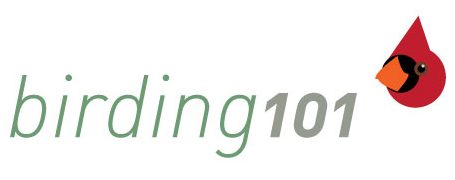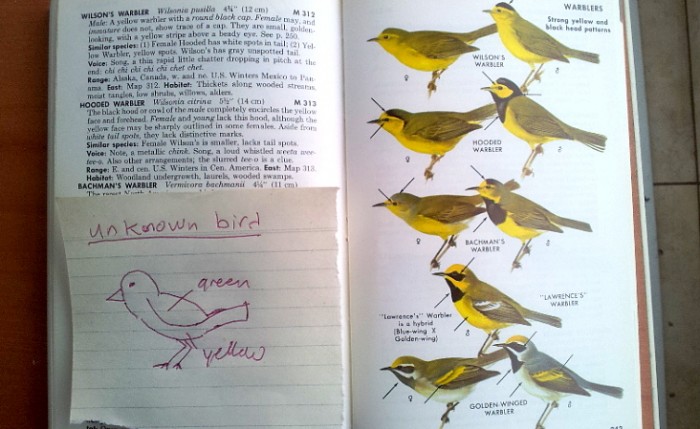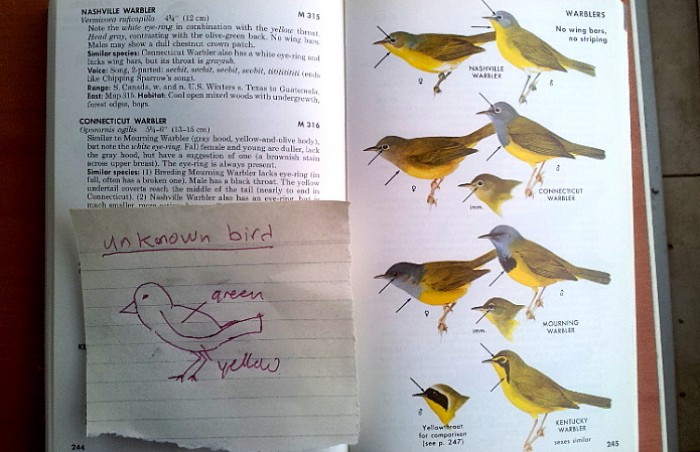How to start birding. Intro 2.
It used to be so hard
Before you had to buy a field guide, buy binoculars and join organized bird walks with experienced guides to get started. But as soon as you were left on your own you’d be totally lost. You would never be sure of identification if you did not have a mentor to ask. Sure you could take some notes to look up later, but still it was more often not possible to get the ID confirmed. You looked for the wrong things and you would miss important features. It was simply not enough to state that it was green above and yellow below.
Which one was it?
If you did not have almost constant access to an experienced birder that would take you out birding, you’d have a hard time to get beyond the threshold every beginner experience. Now with communities on the internet and especially Facebook, we can just share a photo. You say: I think this may be a Nashville Warbler. Someone will likely help you. There is some evidence of what you have seen. There is instant confirmation.
Blog update.
We are gaining momentum for this blog and the future ebook. Please note that these first posts written by Gunnar Engblom are mainly to anticipate the future posts and chapters. In the coming posts I shall show who the collaborators are. I am sure you shall recognize many names. Subscribe by email or RSS not to miss any posts.
Please comment on your frustrations with bird identifications below.
————————————————————–
Gunnar Engblom
Connect with Gunnar on Facebook or Twitter or kolibriexp@gmail.com



Gunnar,
I have seen a lot of your comments and posts via the ABA Facebook group (I am a lurker). I am greatly intrigued by learning and how people learn, so this series of posts is quite worthwhile. I can’t wait to see the outcome of this series!
As an instructional designer by day, I design a lot of scientific adult learning (meteorology specifically). I agree with a lot of your concepts like learning on your own terms and using social networking to develop knowledge. However, I have hesitance at the same time with some of your statements like you don’t need a mentor. You are saying this, but then stating that you are going to Facebook or a social media site to get confirmation. This IS a mentorship, a shared community mentorship. Think of this like a president versus a board of directors. One hesitance here I guess is with the verbiage, not the concept.
As the internet has evolved, so have we. We have reached a point now where the internet is taking over a lot of our base knowledge. The bottom of Bloom’s taxonomy is disappearing from the learning environment except in some niche jobs where time is of the essence (think pilots, surgeons, and others in life-threatening/life-saving situations).
We now expect to Google an answer in seconds. You can search for the 28th President of the United States and come up with a very quick answer. You can convert hectopascals to millibars without even pressing enter. You can search for something complex like a song that you don’t know the lyrics to by typing in (or dictating) the general sounds made. Then have it downloaded in seconds to your phone or iDevice. This is the future of birding in a way. Just wait for it. We are even starting to see bird migration forecasts (read as: my two degrees are in meteorology).
The things we now need to “know by heart” are different because of the internet. So I do agree with you that the internet is helping, but at the same time, the internet is not helping.
In the past few days, I have noted multiple answers on the Facebook Bird ID group that have been spurious at first, then after a “sort of” discussion, the conclusion is laid out by an expert. We don’t know if that person is really an expert or not, we just kind of assume. So if we just followed the beginning of the discussion we learned the wrong information. This is where the internet fails us. The expert may only just present the answer: “Yellow Warbler”. We need to, as a community, think about how we are teaching people to love birding. I know it has been said before, and it will be said again, how do we get people interested in birding: it is unique for each person. We need to be ready for that with open arms and open minds.
As online lurkers, we can follow an online discussion as long as we feel like. So maybe the internet isn’t failing us, but we are failing us. If we are on the sidelines, we don’t have to follow anything. We might follow it if it is a train wreck or car accident of sorts where we crave the conclusion, but otherwise, we might not fully care (unless we are the photographer). The holy grail here is a discussion that everyone follows with unlimited interest. There are still some things to work on in the internet age.
I like the conversation you are starting and want to hear more (unlimited interest? maybe.). I think some of the discussions that are occurring on the internet with respect to learning are poorly set up for certain levels of learning, specifically beginners. If you have a solution in mind, I can’t wait! Tell me, tell me! Otherwise, I welcome the chance to discuss the shortcomings in some senses of the birding community, or to put it another way the disconnect between experts and beginners.
Thanks for starting this series. I am excited to see the discussion evolve. Didn’t think I would be posting a comment about learning and birding tonight, but being open is what I am going for so here I am.
Hi Bryan
Thanks so much for your comments. Yes, you are right of course that the internet or the Facebook group is a mentor in many ways. But what I meant in the word was more the personified mentor that leads the birdwalk, or the birding dad/mom/uncle/aunt/grandparent or your biology teacher who takes you under his/her wings and mentor you in a classical sense. Facebook groups can in many ways, if not substitute the mentor, at least mimic him/her to also be available to those that are not fortunate to have a one-by-one person mentor.
I agree that in Facebook groups for birders, many times the “experts” are not helping if they only give the answer without any reasoning behind it. But you can often tell who the real experts are, if the same develop some arguments why this or that is a Yellow Warbler.
Even if they are not well-known “experts” they will soon enjoy some clout for being people who share knowledge in a helpful way.
Many Facebook groups often don’t have direction to be particularly useful for learning, as there are no particular rules or guidelines posted. Groups just called “birdwatching” or similar often lacks this direction. But this can easily be addressed in the Facebook group description and trying to narrow down the objectives of the group.
Just today Drew Weber and Chad Kauffman set up a group called “ID that PA Bird! Pennsylvania Bird Identification”. Whether or not it will be useful for newbies remains to be seen, but it all depends on the “expert” members how inclusive they want to be.
Another example, which indeed will specifically will have the direction to help beginner birders, is the group I created when I first thought of the idea of a birdwatching manual for the digital age – Birding School North America https://www.facebook.com/groups/birdingschool/. The group has not taken off yet, but it could well be central for the blog-series.
I think I will just make a short addition to the description of that group as to make it more useful to beginners.
Good Morning Gunnar & Bryan,
I found your comments very interesting and enlightening. I don’t have time to comment in detail (I have a little birding to do this morning) but I just took a look at the Birding School North America site and it looks like a good fit for me as I am just beginning on my “birding” journey. I was initially interested in photography, and then became very interested in finding out more about the beautiful birds I was capturing with my camera! I think I need a more formal and structured approach than the blogs offer, even though I am enjoying interacting with some of the birders who offer comments, educational, or otherwise. I am glad I found this new website as I am excited to have a more educational/learning approach to birding in addition to the “birding blog”. Thank You!
Terri
Thank you Terri for the encouraging comments!
I like the concept of your blog! As a retired educator, I have seen that students learn in a multitude of different ways! We each have our own unique learning style that affects how we approach learning any new subject. Why not toss this out there like a live preserver for those who are “sinking” as traditional “binoc & book” birders?
I regularly bird with two other knowledgeable birders. When we go out, I’m often the only one lugging the heavy field guide while one looks birds up on her iPhone and the other snaps photos. Our different styles compliment each other and we each have a lot to teach each other. We all photograph birds. Some of us grab the camera first, some of us go for the binocs. It just works for us as a group. But, it’s always nice to get home and look at the pictures–either for further i.d. of a tough one, for a confirmation from an online group, or just to revisit a beautiful birding moment!
Anxious to read further blogs! Keep up the good work!
Sounds like you have found perfect match there with your birding friends. It is specifically that we make the bar lower. I think will make this approach win more people over to become more serious about birding.
Although I have met a few birders, there are none in my personal circle of friends. My preference, right or wrong, has always been solitary birding, but I did go out with an experienced birder on a couple of occasions, and found it very helpful.
Birdforum.net has been a great help to me with IDs, and my local Facebook group is both knowledgeable and credible.
I suspect that any way we get help is good.
Hi Hugh,
Sorry for the delay to comment on your your comment. I think you do touch a very important aspect here. Although social birding is great and a lot of fun, there has to be a lot of people who are doing the birding on their own. It is certainly possible nowadays, since you can find your community on line. It was not as easy when I got started.